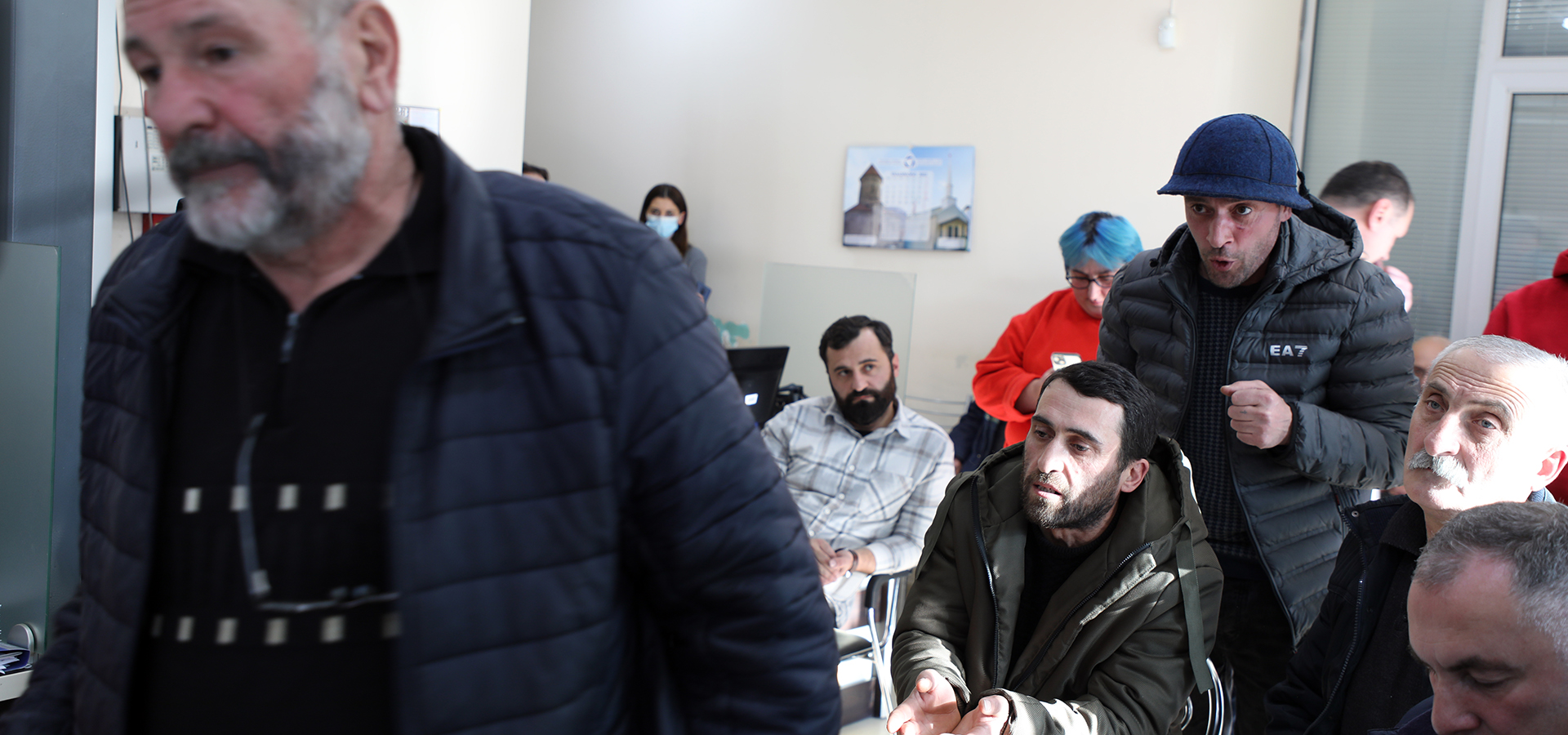In a popular tourist resort Shovi near Mamisoni Pass, Racha, persons affiliated with the ruling Georgian Dream party were granted a license to construct 18-meter hotel-like residential buildings.
Local residents fear that these apartments are geared towards and will be predominantly purchased by Russian nationals, who have been fleeing Russia and flooding across the border into Georgia en mass since the start of the war with Ukraine. The proliferation of Russians owning private property near the borderline regions raises concerns among locals and the wider population.
Shovi resort is the last region within Georgian control along the so-called Ossetia military pass, which connects Georgia with North Ossetia (Alania) through the Mamisoni Pass.
Within a wider annexation of the adjacent region, Mamisoni Pass has been occupied by Russia since 2009 (Russia has been incrementally moving occupational lines deeper into Georgia ever since the Russo-Georgian War of 2008, a practice referred to as - sliding borderization). The now-deserted village remnant Ghurshevi, part of river Chanchakhi valley, and a 2 km stretch of road leading to Mamisoni have subsequently ended up on the Russian-controlled side of the occupational line.
During his meeting with the locals on September 2nd, 2020, Partnership fund executive director and a Bidzina Ivanishvili trustee - Davit Saganelidze, talked about the importance of re-opening this road for use, which has served as an arterial link between the two now-estranged regions.
In a conversation between Grigory Karasin and Zurab Abashidze that has recently come to light, Karasin has likely meant the Mamisoni roadway when discussing a new linkage corridor with Georgia. Reconstruction works up to the nearest administrative center to the Mamisoni pass - Nizhny Zaramag in north Ossetia is already underway, with a half-kilometer-long tunnel opening up for use on the 13th of December 2022; Russia's Vladimir Putin has remotely joined the ceremonial opening.
***
The regulation plan for Shovi resort development (DRP, hereafter) in Racha, for which we paid over half a million GEL from the budget to Artstudio Project LLC, is effectively granting a monopoly to former and working government officials and high-ranking businessmen.
The Ministry of Regional Development and Infrastructure presented the DRP to Oni city hall on the 19th of March, 2020, and the public discussion of the DRP subsequently took place two years after - on the 23rd of March, 2022, in Oni House of Culture. That was when Glola village residents realized that according to the document, the newly-revised confines of the residence now stretched multiple times the original area and had subsumed portions of historically Glola-owned territory which still remains in their de facto ownership – “Gani of Glakhti”, “Tevri of Qvabisi”, and “Skhara”. The regional development regulation plan includes granting the rights to construct 18-meter hotel-like residential buildings. Over 95% of privately owned roadside plots have ended up within the newly-defined landscape-recreational zone, where commercial construction is fully prohibited.
“This was and still is one of our primary reasons for opposition. They will construct residences and sell apartments, as they have done in Bakuriani and Gudauri in recent years. Shovi will also lose the tourist resort function. Such “urbanistic” development of Shovi will not serve any good for local residents and directly contradicts regions' natural development,” Glolian resident Giorgi Bidzishvili tells us.
Following the protests of the residents, the Oni municipality mayor assembled a workforce consisting of the project author and ministry representative who, together with the city hall, were supposed to study the disputed matters in detail.
Neither the project author (Artstudio) nor the representatives of the ministry partook in any of the workforce meetings. Project leader Giorgi Sulaberidze tuned in online only for the final meeting, where he presented the revised zoning map of the resort, as follows:
- More territory is now eligible for constructing 18-meter buildings;
- Upon territories, housing registered private property of Glola residents have been re-designated from recreational zone 1 to landscape-recreational zone 1, which means that the locals are now prohibited from any and all construction, even one-story cafes;
- At the same time, the Kutaisi City Court, with mediation from Western Georgia’s District Prosecutor’s office, seized all 42 plots of land belonging to Glolians.
Nowhere within the 117-page DRP document could we find elaborations on what caused these controversial shake-ups.
Oni City Hall sent the revised zoning map of the Shovi resort to the council for approval without neither holding a public discussion of the finalized version of the plan, nor publishing it. They were obliged to do so by law.
On the 22nd of December, 2022, despite the hanging questions and well-founded objections raised by the locals, the chairman of the city council, Bachana Markoishvili, declared the plan approved with at least 10 out of 25 members present never even raising hands in approval; they later recorded in the official report that 22 members voted – 17 in favor, 5 against. The council needed at least 13 votes – over half of the members present – for approval.
What, and to the benefit of whom, was changed on the zoning map
The first variant of the Shovi development plan and its functional zoning map, dated August 2018, is still published on the website of the Ministry of Regional Development and Infrastructure.
The initial map concerns four main zones:
- Landscape-recreational zone (LRZ) - only constructions responsible for the functionality of the zone are permitted.
- Recreational zone (RZ) – here, it is allowed to place the necessary infrastructure for sporting events, open fields, extreme sports, cultural learning, and tourism, including cafes, bars, and recreational and entertainment facilities.
- Sports & recreational zone 1 (SRZ 1) – allowing placement of family hotels, recreational buildings, spa-rehabilitation facilities, catering and entertainment services, small commercial trade services, garages, and auxiliary buildings.
- Resort-recreational zone 2 (SRZ 2) – permits sanatoriums, hotels, hotel-type housing, recreational buildings, entertainment centers, small commercial trade services, garages, and support buildings.
Resort-recreational zone 1 and 2 are differentiated by size regulation. For zone 1, minimum land area requirement is 200 square meters (width 10m X length 20m), and for zone 2, 1000 square meters (width 20m X length 50m). A 15-meter tall structure is allowed to be erected in zone 1, given that the plot of land satisfies the above parameters, and 18 meters for zone 2 (6-story). If a plot falls within these zones but falls short of 200 and 1000 square meters for zone 1 and 2, respectively, the construction permit will not be granted.
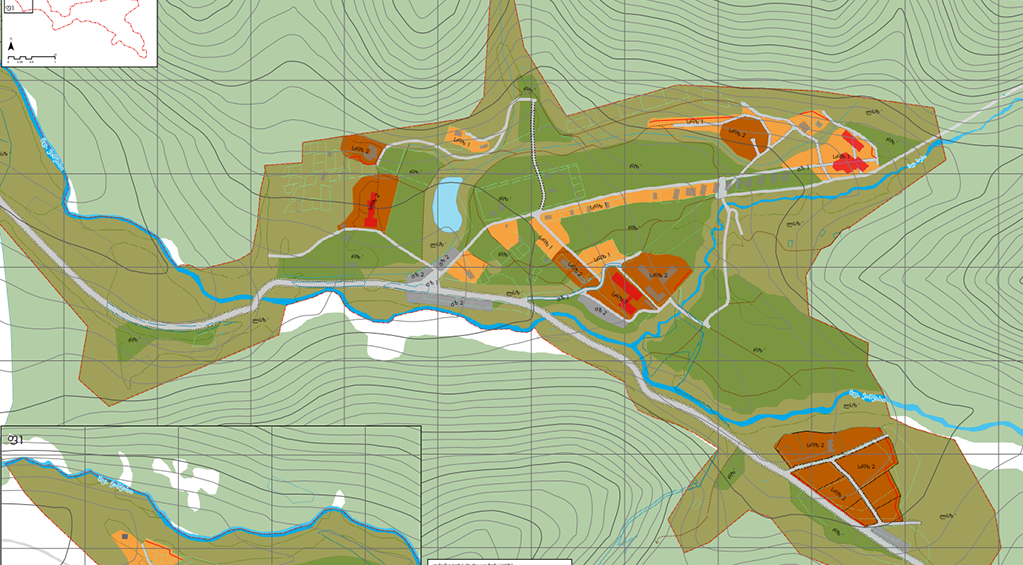
The initial version of the map from the Shovi resort development regulation plan
The initial map didn’t account for zone 5 at all – an area to be studied and worked on in detail – marked in pink on the reworked map. The development regulation plan never elaborates on this zone, however, as stated by the head of the city hall’s infrastructure service, Temur Grdzelishvili at the meeting of the city council, on December 22nd, “the area is to be studied and processed in detail means that the city hall could grant construction permits to private owners whose property falls into this zone after conducting a study of the area”.
This area, marked in pink on the revised map, completely fell within the landscape-recreational zone on the first version of the map, where all construction, private or commercial, was prohibited.
Vasil Metreveli, the chairman of the Georgia Dream faction of the Oni municipality council, was decidedly against the approval of the Shovi resort development regulation plan according to the original version of the map. Mr. Metreveli, however, would soon change his tune. At the meeting held on December 22, as DRP was being approved with the modified map, he did not participate in the voting, stating that he did not want to influence anyone. Glola residents have reminded him that before the said zone turned pink on the updated map, he was “singing a different tune”.
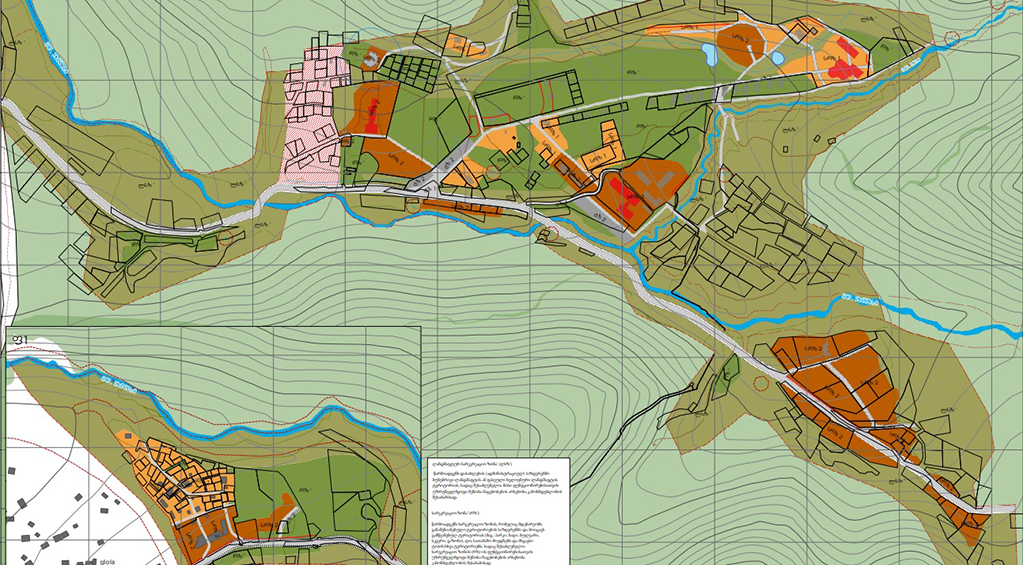
Corrected version of the zonal map from the Shovi resort development regulation plan
Soon, the possible reasons behind the chairman’s hesitancy would reveal themselves. The thing is, Vasil Metreveli’s family owns several plots of land in the now-pink sector – Marina Bagashvili, the wife of the head of the Georgia Dream faction, owns 1501 square meters within the area.
On May 3rd, 2022, the Oni district administration sold 16000 m2 in the Shovi resort, in the vicinity of the boarding house Mamisoni. At that time, the governor of the Oni district was Vasil Metreveli. According to the purchase agreement, Vasil Sherazadishvili bought the land for 5920 GEL, which works out to 37 Tetri – equivalent to 0.15 USD - per square meter. Metreveli and Sherazadishvili are friends.
The current deputy chairman of the Oni City Council, Alaverd Khvedeliani, owns 399 m2 of land in the area marked pink. He eagerly supported the DRP’s approval and urged other members of the council to follow suit.
Archil Japaridze, the governor of Racha-Lechkhum-Kvemo Svaneti between 2017 and 2020, owns a 500 m2 plot of land. According to public registry documentation, Archil acquired the plot in 2006 but registered it as his private property only in October 2018. The public registry could not establish the identity of the 500 m2 mentioned in the purchase agreement with the plot shown on the measurement plan. The identity of the plot of land was confirmed to the governor of the region by Emzar Sabanadze, the then-mayor of Oni municipality.
Further 1000 m2 belongs to Davit Darakhvelidze, who was the Minister of Internally Displaced Persons, Resettlement, and Refugees from the occupied territories from 2012-2014. In 2002, that is, at the time when the Oni district administration sold a 16,000 m2 plot of land in Shovi to Vasil Sherazadishvili by auction, Darakhvelidze was serving as the governor of Racha-Lechkhum-Kvemo Svaneti.
Davit Darakhvelidze, Archil Japaridze, Vasil Metreveli's wife - Marina Bagashvili, Alaverd Khvedeliani, and other persons have bought plots of land in Shovi from Vasil Sherazadishvili, some soon after, some after they were no longer officials. More than 90% of the land plots in the area marked in pink are completely covered with perennial conifers; in case of construction, spruce, Sochi, and pine need to be cut down.
Irakli Qafianidze and Archi Group links
According to the initial version of the zonal map, a lake was to be accommodated in the government-owned landscape-recreational zone next to sanatorium Mamisoni. The lake has disappeared on the updated version of the map, though, and the surrounding area was transformed into resort-recreational and recreational zones, where 18-meter buildings, spa-rehabilitation facilities, and tourism infrastructure including cafes and recreational areas are allowed.
This territory, spanning an area of 25247 m2, was sold by the National State Property Agency on September 8, 2021, for 44 GEL per m2. The Shovi development regulation plan, at the time, already existed in its complete form. The average market value of 1 m2 of non-agricultural land in the resort area was at least 50 USD (155 GEL at the then exchange rate).
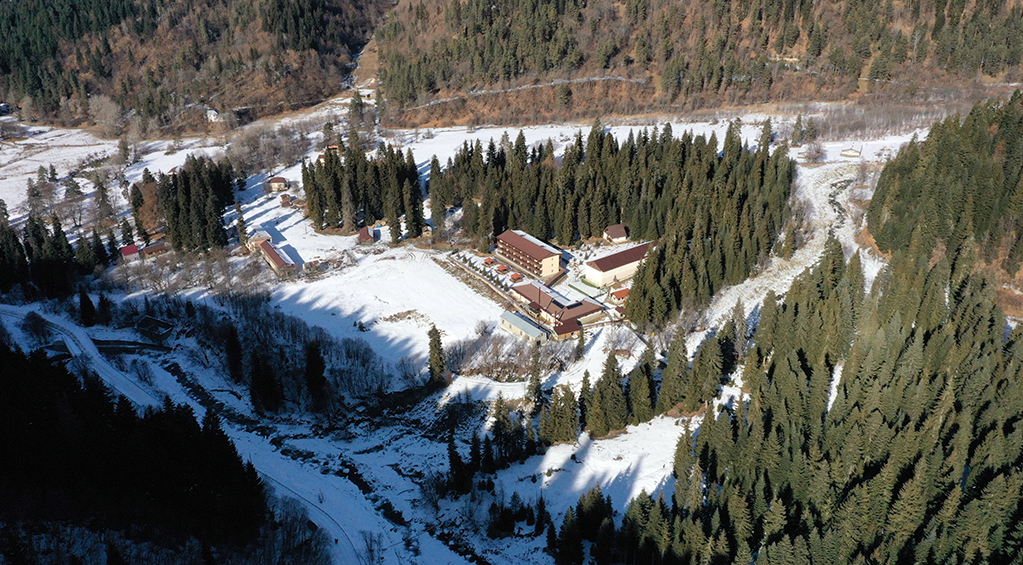
Hotel and territory in Shovi owned by Irakli Kafianidze who is linked with Archi Group
Glola population meeting accounts from August 16, 2021, testify that the residents were against selling this land. They emphasize that the locals were using it for mowing and grazing. The state sold the land anyway. According to the legislation, it is not mandatory for the National Agency of State Property to take into account the refusal of the local population or the opinion of the City Hall, however, our analysis of the 2021-2022 practice clearly shows that the state tends to take decisions contrary to the population when the buyer of land is an influential person.
A plot of land was acquired by Irakli Kafianidze, who is the director of Property Management LLC – a company that owns Sunset Shovi hotel, as well as 14999 m2 of land in Shovi resort. Apart from Property Management, Kafianidze is the director of 19 other companies. (Silver 39 LLC, Depot, Leselidze+ LLC, Lake View LLC, National Park LLC, View Point LLC, Prime Digomi LLC, etc.) He is a former director or partner of Archi Investments LLC, Prime Arch, and other companies related to Archi Group (Kera Development LLC, Novo Tech LLC, Itong Caucasus LLC, Teknika LLC, Bakuriani Resort LLC, Tbilisi View LLC, Archi Energy LLC, Old City Hospitality LLC, Archi Gldani LLC, etc.). The full owner or shareholder of these companies is Ivliane Tsulaia, a member of the Parliament from the majority party Georgian Dream between the years 2016-2020. According to property declarations, Tsulaia has loaned out 9 600 000 US dollars to 13 contractors, including the companies listed above.
Materials gathered by the investigative journalists' coalition Ai Fact suggest that the Archi group has links with Tbilisi mayor Kakha Kaladze.
According to a piece by the TV channel Formula, Ivliane Tsulaia is Kaladze’s best man and a godfather to his son.
Irakli Qafianidze donated 150 thousand GEL to Georgian Dream for the election in 2016-2018.
After acquiring an additional 25247 m2 in Shovi on November 27th, 2021, Kafianidze filed a complaint with the Oni Municipality City Hall requesting that the right of ownership of 4997 m2 plot on the adjacent land be revoked from Glola’s local - Gia Bichashvili. The Mayor of Oni, Sergo Khidasheli, satisfied Kafianidze’s request and canceled the order issued by the previous mayor, who confirmed to Bichashvili that the said plot belonged to him. On the basis of the mayor’s letter, the ownership registration was canceled by the Public Registry Agency. Following this dispute, a confrontation between Bichashvili and Qafianidze ensued, during which, according to eyewitness reports, Qafianidze’s bodyguards fired a shot.
Glola’s permanent residents recalled multiple instances when Irakli Qafianidze personally hosted Tbilisi mayor – Kakha Kaladze’s wife and children.
Qafianidze wasn’t the only one to whom the National Agency of State Property sold a plot on September 8, 2021, despite the refusal of Glola residents. 2657 m2 of land was purchased by Jemal Gagua, who has links with Qafianidze. Qafianidze was the head of Private Arbitration LLC, whose 100% owner is Jemal Gagua. Gagua too, paid only a third of the market price – 47 Gel – per m2. The said plot falls within the recreational zone in the Shovi development regulation plan and is allowed certain types of construction.
Bichashvili father and son
A 37 169 m2 of land in Shovi and Shkhara belongs to the former parliament member (1995-1999) Giorgi (Gogi) Bichashvili and his children – Gvantsa Bichashvili-Gavasheli and Giorgi Bichashvili. The same family owns Turbaza Shovi, located on the left side of the road at the entrance to the Shovi resort. In total, all seven properties are located within the brown-designated zone of the Shovi development regulation plan, allowing Bichashvili father and son to build hotels, restaurants, and 18-meter hotel-like residences.
Between 2014-2017, Giorgi Bichashvili was the director of the Public Security Management Center, 122. He was appointed to the position during the ministerial tenure of Irakli Gharibashvili and is a person close to him. In April 2017, the state transferred the ownership of Shovi’s 7500 m2 of non-agricultural land and structures located on it to Giorgi Bichashvili through direct privatization for a symbolic 1 GEL, without any investment obligations to go with the purchase. Bichashvili claims that this property was wrongfully seized from his family during the Saakashvili government run and is rightfully theirs.
In May 2019, Giorgi Bichashvili transferred the said plot of land to M2 Hospitality LLC under the purchase agreement, the owner of 100% of whose shares was the joint-stock company M2 Real Estate, currently operating under the name Georgian Real Estate. In 2020, the said plot was bought from this company by Milki LLC, whose founder and director is Irakli Kafianidze.
The Kazakh “investor”
Since 2008, 159,969 m2 in Shovi together with the buildings and structures located on it has been owned by the joint-stock company Pansionati Mamisoni, the members of the supervisory board of which are citizens of Kazakhstan: Temirzhan Meirambekov, Asel Sokrupova, Alzhan Akmoldaev. “Pansionati Mamison” was state property until September 2006, when Vladimir Tsomaia bought the entire property from the Ministry of Economy for USD 510,000, without any investment obligations. Soon after, Tsomaia officially transferred the ownership to a citizen of Kazakhstan.
Since 2008, the Kazakh “investor” and his Georgian representatives have promised time and again to build a world-class, year-round health resort, which would accommodate 60 000 visitors a year. As of now, 14 years later, the place still sits high and dry, with no construction work ever having started.
Currently, under the order of Pensionat Mamisoni, the managing company of the Show Resort project is Symmetry, whose director is Tariel Gabunia since 2015. Before that, he was the director of Rukhi Shopping Center, Georgian Product, and Tbilisi Logistics Center in the Partnership Fund.
In 2021, the Prosecutor's Office forcibly handed over the real estate in Shovi from the joint-stock company’s former director Gela Gutashvili in favor of Pansionat Mamisoni. The Prosecutor's Office threatened arrest if Gutashvili refused their orders. More on this in the Georgian News special report.
Deprivation of private property
Glola is the final inhabited Rachan village along the Mamisoni Pass. At the initiative of Dr. Shamshe Lezhava in the 1920s, the Glola village pastures were chosen to establish the Shovi resort because of coniferous forests, favorable climate, and mineral waters. Shovi’s tourist season is a significant determinant of the local population's economic state. Because of the proximity to the resort, locals in Glola have set up family hotels, which have recently been enjoying increasing demand but couldn’t curb the continuous exodus from the village. Compared to the headcount of 2002, the population tally has quartered in the last 20 years and counts 100 permanent residents.
“They say that if a resort is developed here, locals could sell milk and cheese. Who will be left with the unsold milk and cheese? The problem is that people aren’t given a chance to have milk and cheese in the first place.
We don’t even have the right to set up a small open-air café on the side of the road. Under the same conditions, businessmen and other influential persons are privileged to all the lands where construction is allowed. They can do it, but locals can’t. The difference is the owners.
DRP was developed for and serves the purpose of denying the Glola population interest in development above the Turbaza bridge. They will also scare away the remaining of dwindling youth in the region, who have stayed here up to now,” Glola’s Giorgi Bidzishvili owns a property that belonged to the recreational zone in the initial version of DRP. He was planning on setting up a fish restaurant here. On the redrafted version of the map, though, the property fell within the landscape-recreational zone, where no construction is allowed.
According to the 2020-2021 precedential rulings of the Supreme Court of Georgia, establishing the zoning policy which disproportionately interferes with the right of private property and does not establish the priority of protecting public interests with its regulations, not only violates the judicial requirements of “spatial arrangement and town planning basics”, but also goes against the stipulated criteria of Article 21 of the constitution of Georgia. For these reasons, the Supreme Court has annulled certain parts of the general land-usage plan of Tbilisi. Based on the Supreme Court’s established practice, the degree of restriction should not exceed a reasonable limit, past which the restriction verges into a violation of personal property rights and in effect equate to deprivation of the right to property.
Neither the DRP nor the revised map includes any justification as to how proportionate such levels of personal property restrictions are with serving public interests and achieving mutual goals in the region. The matter was never discussed by the Oni mayor and the city council, either. The questions of Bidzishvili and Gutashvili were left unanswered by the Council.
Mountain Stories contacted Artstudio Project with a request to conduct an interview with the project author Giorgi Sulaberidze. The interview was rejected. We couldn’t elicit any elaborations or insights as to what caused the changes made to the initial DRP map and the worsening of the legal standing of the Glola population from the Ministry of Regional Development and Infrastructure, either.
“DRP author, Giorgi Sulaberidze told me, that he updated the map in the exact way instructed by the Ministry. The construction of residential buildings will prompt foreign citizens to enter and buy apartments and establish private property. In reality, we are getting a picture where here, which is a borderline region, risks are increasing of a mass influx of foreigners,” Giorgi Bidzishvili and fellow youngsters organized a community gathering, where they demanded the Municipality Council cancel the resolution by which the DRP was declared approved.
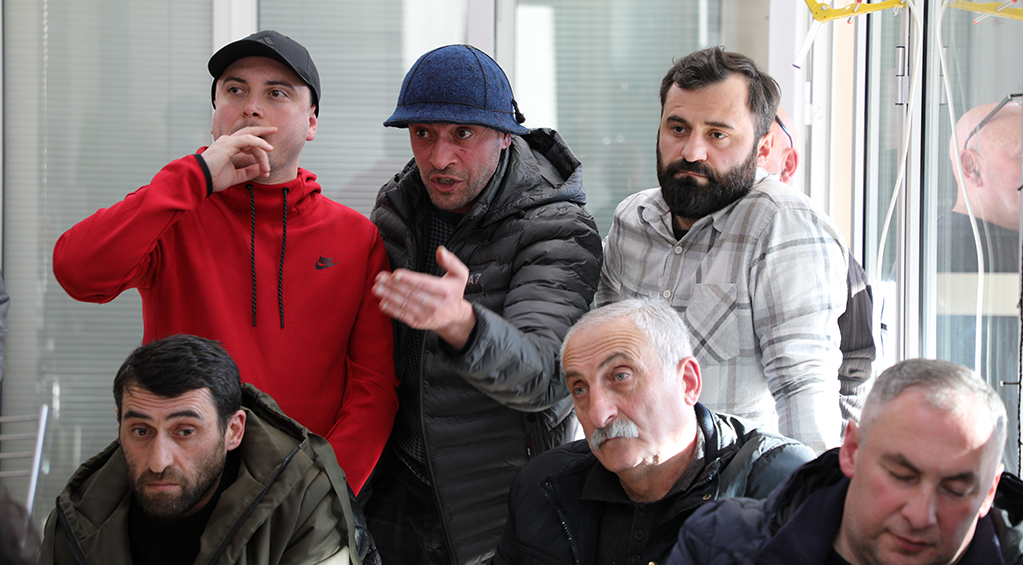
Residents of Glola village demanding the annulation of the Council’s decision
Increased Russian threat near Mamisoni
On February 1st, a recording of a phone call was released on Youtube, documenting a conversation between Grigory Karasin and Zurad Abashidze, a chairman of the International Affairs Committee of the Russian Federation, and a special representative of the Prime Minister of Georgia concerned with relations with Russia, respectively.
“I talked with our Transport Ministry leadership. They hinted that they have plans for a prospect of building a linkage corridor between you and us,” tells Karasin to Abashidze.
According to the recording, Karasin designates the area to the left of South Ossetia for the construction of this corridor.
Abashidze explains to Karasin that on the Khazberi-Larsi side (to the right of South Ossetia) the construction of a new highway is underway, which is scheduled to complete in a year and a half (this refers to a Russia-bound road through Khada). “Now is not the time to talk about starting something new or spreading information,” says Abashidze, who later confirmed the authenticity of the recording with Georgian Public Broadcaster’s First Channel. Prime Minister’s special representative elaborated that he had this conversation with Karasin in June of last year when Khazbegi-Larsi roadway was overcrowded with traffic from both sides.
According to the international rules for determining orientation on the ground (sides of the horizon), the so-called to the left of South Ossetia is Racha, with Mamison Pass, 2819 meters above sea level. Russia has occupied the pass since 2009. The Russian military has set up a sector at the Mamisoni weather station. Up to and including 2008, Georgian border guards were stationed in the weather station. After the snowfall, when the border on the Caucasus naturally closed, they used to leave the weather station and land near Shovi. In the spring of 2009, the Georgian border protection unit was greeted by a Russian flag and Russian soldiers at the weather station.
Village remnant Ghurshevi, part of Chanchakhi river valley, and even a 2-kilometer stretch of highway leading to Mamisoni, which is the only access road to the border police checkpoint located on the opposite side of Ghurshevi, were left on the other side of the occupational line. This highway was also routinely used by Glola people to reach their arable crops and meadows at the base of Chanchakhi, where they had cattle farms in summer and grew potatoes.
Through the Mamisni pass lies the so-called Ossetian military way, which connected Kutaisi (Georgia) with railway station Darg-kokh (North Ossetia). Construction of the road started in 1858 and ended in 1888. The road had been in use by Rachans and Ossetians until the Russo-Georgia war of 2008, after which it closed down. In summer, Russian soldiers climb the Mamisoni pass with heavy-duty off-road vehicles.
The importance of reopening this road was the central subject of the Executive Director of the Partnership Fund and Bidzina Ivanishvili’s trusted person – Davit Saganelidze’s meeting with Oni residents on September 2, 2020.
“I await the opening of Mamisoni and it will inevitably open, and it should definitely open. We have to settle our relationship with our neighbor, because this road is important for Oni and this region, and I will do anything to accomplish this together with you”, he said.
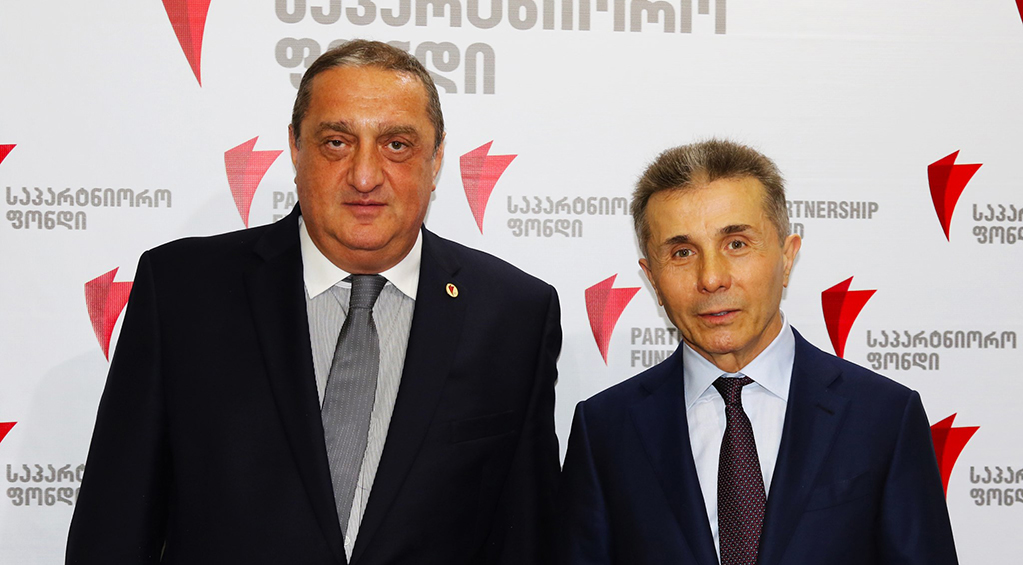
Partnership Fund’s Director Davit Saganelidze and Bidzina Ivanishvili
In North Ossetia, reconstruction work (two-lane asphalt-concrete road arrangement) is already underway up to Nizhny Zaramag, which is the closes administrative center to Mamisoni Pass, with a half-kilometer tunnel opening for use on 13 December 2022. Russia’s Vladimir Putin remotely joined the ceremonial opening.
“A new domestic flights terminal will soon come online in Vladikavkaz airport and a tunnel leading to Mamisoni recreation complex will open. These novelties will boost the growth of tourism to the South, reinforce this region's competitiveness and attract investments,” declared Putin.
The head of the Republic of North Ossetia, Sergey Menyaylo emphasized that “the construction of the tunnel is only the first step. We have two more sections of the road already under construction. We worked our way to Mamisoni itself”.
The reconstruction of the highway from the Transcaucasian highway (the only road that connects the occupied Tskhinvali region with Russia) to Nizhny Zaramag is planned to be completed by the end of 2023. Tariel Soliev, chairman of the North Ossetia Committee on Transport and Road Infrastructure, announced on February 10, 2023, that 100% of funding has already been approved. From Nizhny Zaramag, the road continues to the Mamisoni complex.
It was planned to welcome the first wave of tourists to the year-round resort Mamisoni in 2018, but the project was stopped. In 2019, by the decision of the Russian government, Mamisoni became a special economic zone once again.
Doppelmayr Russia, a subsidiary of the famous Austrian company Doppelmayr, was engaged in the preparation of project documentation. According to the goals, the resort should have two cable cars that will carry 2600 and 2400 people per hour, a complex of ski tracks with a total length of 14 km, and an entertainment complex Snow Park.
The deadline for Mamisoni project completion was pushed to 2024 after Doppelmayer refused to supply skiing supplies due to sanctions that followed the war in Ukraine. “We are looking to acquire supplies through alternative sources from China and Turkey,” said North Ossetia’s Prime Minister, Boris Janaev.
According to the information published by the Council of Ministers of the Russian Federation on January 25, they are currently working to create engineering and road infrastructure from Nizhny Zaramag to Mamisoni.
Also on this topic:
104 thousand hectares of forest in Racha-Lechkhumi-Svaneti, for 49 years, to a partner of the sanctioned Russian oligarch





